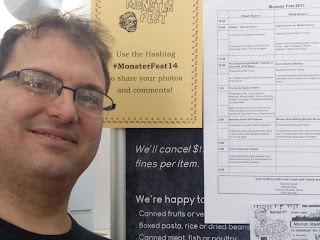I hold three jobs that actually pay the bills. Like most writers, I like to consider my writing a job, a fourth job in my case. Sometimes I consider my membership to the HWA still a fifth job, since I attend meetings, and am the Virginia chapter's events coordinator, but it does not pay me any money. In fact, it costs me a little in membership fees, but I enjoy it nonetheless, and it does provide me connections and opportunities to the publishing world. My main gig that pays the pills is teaching as adjunct faculty at two higher education institutions, which means my summers are (mostly) off. I have a third job that pays a few bills, and I continue working there during the summers, but I still work far fewer hours during the summer months than I do during the school year.
So one of the main things I do during the summer is write, and write a lot more than I do at any other time of the year. It is my most productive season. Most of the short stories, poetry, and non-fiction projects I've published in the past were written during the summer months. That does not mean I do not write at all during other times of the year, but I do have months where I can devote more time to writing and publishing than other moths. My annual writing schedule is something like this:
January: I'm off the the few weeks, but recovering from the holidays. I still find quite a bit of time for writing.
February and March: Early in the semester, I have some time for writing, but once essays start coming in that need grading, my writing time starts to dwindle.
April: Essays pile up to nearly unmanageable levels. Very little writing gets done.
May: First half of the month is finishing up finals and grading, but once final grades are posted I write nearly a full time schedule.
June, July, and August: The nearly full time schedule continues and I can usually be pretty productive during the summer month. Even when classes first start up in late August, not much needs grading yet, so I still find quite a bit of time for writing.
September and October: Since I write primarily horror, these can also be particularly busy months, attending cons as well as classwork starting to pile up. Still, because I primarily write horror, it is also a particularly inspiring time of the year, so I can usually continue to work in at least some writing time.
November: Essays and other classwork piles up again, so not as much writing gets done, with the exception of Thanksgiving break.
December: Not much gets done in the beginning of the month, and after classes end, I usually plan a trip to see family for the holidays, but I still usually work in a decent amount writing time after the fall semester ends.
And if you don't think there's that much grading to do when teaching college English, here is a photo of a stack of items needing grading I took in days before everything was turned in digitally:
- Make a Word file of all my class notes, (One school I teach at is changing over from Blackboard regular to Blackboard Ultra, so my files may not be good any longer. Besides, I have been meaning to do this for a while now. I even applied for a stipend to have my notes published as an Open Educational Resource)
- Finish putting together the short story and poetry collection for self-publication. This is a project I started during the spring semester, and it is pretty close to being finished already. It will feature most (but not all) of my previously published short stories and poems, and a few new short stories I have been shopping around for a while, and have decided to add to the collection.
- Finish editing Blood of the Werewolf. It is so close to being ready to send to an agent or publisher. It only needs about 50 more pages of editing, and maybe one last quick passthrough for continuity. This is a top priority this summer.
- Work on a rough draft of Osiris, the next in my series of historical horror tragedies. I'm thinking about joining Camp Nano to punch out a good portion of a rough draft in July.
- Edit the short story "The Vampire's Coffin" which I did for a writing group recently. It's pretty short, so this should not take very long.
- Finish that next section of Franksploitation non-fiction book and write the proposal on Frankenstein in film. I'm embarrassed at how many years this appears on the list and does not get done. Especially, since the sample chapters are actually pretty close to finished.
- Edit and resubmit a non-fiction article on Ed Wood to a literary magazine. I have done this a few times, but still have not found the right market for it.






